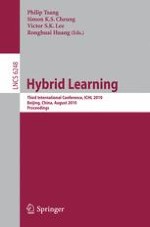The Third International Conference on Hybrid Learning (ICHL 2010) was organized by the School of Continuing and Professional Studies of The Chinese University of Hong Kong, Beijing Normal University, Goethe-Institut China, Caritas Francis Hsu College, and Caritas Bianchi College of Careers. ICHL 2010 provided a platform for knowledge exchange on hybrid learning among educators, researchers and computer scientists, who share a common goal to enhance the quality of learning and teaching in this fast-changing knowledge world, with the support of technology innovation. Hybrid learning has been an ongoing trend for a number of years. It is not merely a simple combination of face-to-face and technology-mediated instruction, but also encompasses different learning strategies for teaching and learning. It places emphasis on outcome-based teaching and learning, and provides a diversified learning envir- ment. Hybrid learning is probably the most efficient learning mode in the present age of globalization, when learning has to be borderless and dynamic in order to address the diverse learning needs of students. Students are given more opportunities to - velop into active independent learners, and to practice practical skills for work and study. It was our pleasure to have three keynote speakers for the ICHL 2010. They were Rebecca Launer from Goethe-Institut, Germany, Bebo White from Stanford Univ- sity, and Yan Ji Chang from Tsinghua University, all of whom shared with us their valuable insights in the hybrid learning field.
